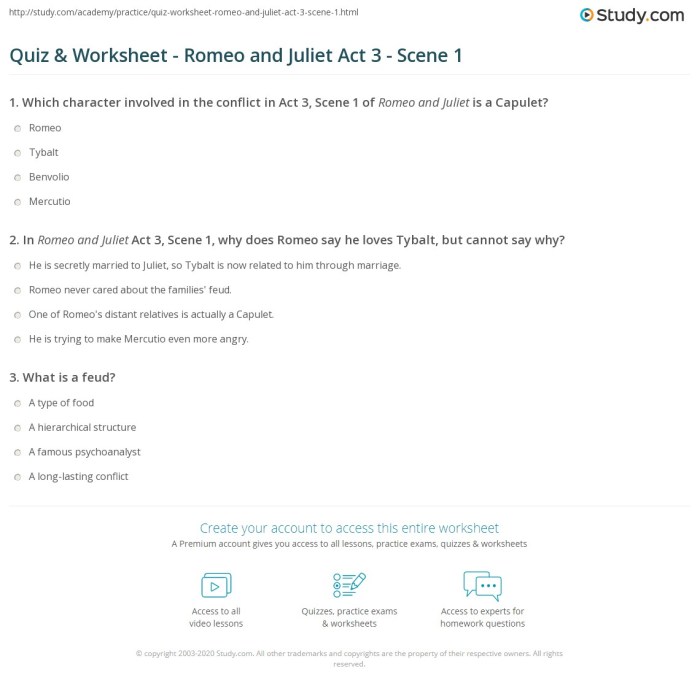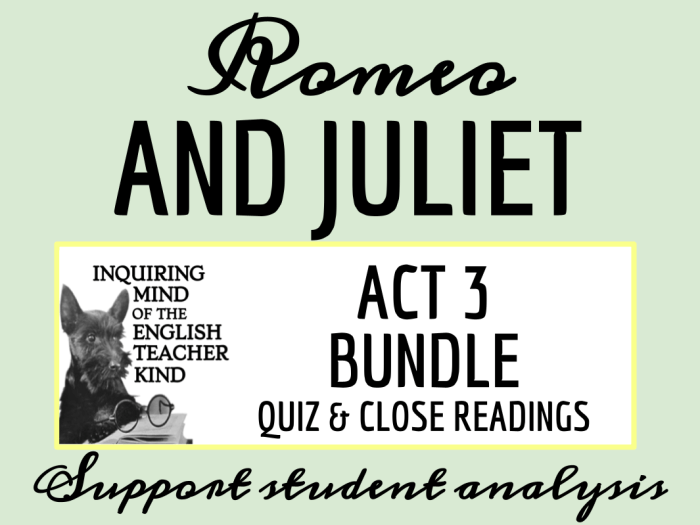Romeo juliet act 3 quiz – Embark on a captivating journey through Romeo and Juliet Act 3 with our engaging quiz. Delve into the heart-wrenching events, intricate character development, and profound cultural themes that shape this iconic play.
As we explore Act 3, we’ll uncover the significance of Tybalt’s confrontation with Romeo, witness Romeo’s evolving maturity, and unravel the dramatic techniques that create suspense and tension. Join us for an immersive experience that illuminates the timeless themes of love, fate, and societal conflict.
Scene Analysis
Act 3, Scene 1 is a pivotal moment in the play, setting the stage for the tragic events to come.
The scene opens with a confrontation between Tybalt and Romeo. Tybalt, enraged by Romeo’s presence at the Capulet’s ball, challenges him to a duel. Romeo, however, is hesitant to fight, as he has recently married Juliet, Tybalt’s cousin. This hesitation angers Tybalt, who believes Romeo is a coward.
The intense events of Romeo and Juliet Act 3 set the stage for a thrilling climax. As you delve into the intricacies of this act, consider expanding your knowledge with the intricacies of the MFR body code for the Ford F150 here . Understanding the MFR body code can enhance your appreciation for the mechanical underpinnings of this iconic pickup truck, while deepening your understanding of Romeo and Juliet’s timeless love story.
The conflict between Tybalt and Romeo escalates when Mercutio, Romeo’s friend, intervenes. Mercutio is killed in the ensuing duel, prompting Romeo to seek revenge. He confronts Tybalt and kills him, an act that has dire consequences for the rest of the play.
Significance of the Confrontation
The confrontation between Tybalt and Romeo is significant for several reasons.
- It sets in motion the chain of events that leads to the tragic deaths of both Romeo and Juliet.
- It reveals Romeo’s inner conflict between his love for Juliet and his duty to his friend, Mercutio.
- It highlights the deep-seated hatred between the Montagues and Capulets, which ultimately destroys both families.
Contribution to the Plot
The events of Act 3, Scene 1 contribute to the overall plot development in several ways.
- They create a sense of urgency and suspense, as the audience knows that Romeo’s actions will have dire consequences.
- They introduce the theme of fate, as the characters are seemingly powerless to stop the tragic events that unfold.
- They foreshadow the play’s tragic ending, as the deaths of Mercutio and Tybalt make it clear that the love between Romeo and Juliet is doomed.
Character Development

In Act 3 of Romeo and Juliet, Romeo undergoes significant character development. His actions and decisions reveal a maturing understanding of love and a growing sense of responsibility.
Evolving Maturity
In earlier acts, Romeo’s love for Rosaline was impulsive and superficial. However, after meeting Juliet, his love deepens and becomes more genuine. In Act 3, he is willing to risk his life for her, demonstrating his newfound maturity and commitment.
Understanding of Love
Romeo’s initial understanding of love was based on physical attraction and infatuation. However, as he spends more time with Juliet, he comes to appreciate the emotional and spiritual aspects of love. This is evident in his eloquent speeches about Juliet’s beauty and his desire to be with her forever.
Comparison to Earlier Acts
In Act 3, Romeo’s behavior is markedly different from his behavior in earlier acts. He is no longer the reckless and impulsive youth. Instead, he is a responsible and caring young man who is deeply in love.
Dramatic Techniques: Romeo Juliet Act 3 Quiz
Act 3 of Romeo and Juliet showcases Shakespeare’s masterful use of dramatic techniques to heighten the play’s emotional impact and suspense.
Dramatic Irony, Romeo juliet act 3 quiz
Dramatic irony occurs when the audience is aware of information that the characters are not. In Act 3, this technique is employed to create a sense of impending doom and to highlight the characters’ tragic flaws.
For instance, when Romeo mistakenly believes Juliet is dead, his grief and despair are intensified by the audience’s knowledge of her feigned death.
Foreshadowing
Shakespeare also uses foreshadowing throughout Act 3 to create suspense and tension. By hinting at future events, he builds anticipation and dread within the audience.
Examples of foreshadowing include Friar Laurence’s warning to Romeo about the consequences of his impulsive actions and the Nurse’s ominous dream about Tybalt’s death.
Language and Imagery
The language and imagery employed in Act 3 contribute significantly to the play’s overall tone and atmosphere. Shakespeare’s use of vivid metaphors and similes creates a sense of heightened emotion and intensity.
For instance, Romeo’s description of Juliet as “the sun” emphasizes her radiant beauty and the transformative power of their love.
Cultural Context

Set in 16th century Verona, Romeo and Juliet reflects the vibrant and complex cultural landscape of Elizabethan England. The play’s themes, characters, and plotlines are deeply intertwined with the values, beliefs, and social norms of the era.
Elizabethan society was characterized by a strong emphasis on social hierarchy, honor, and family loyalty. These values are reflected in the play’s depiction of the Montague and Capulet families, whose bitter feud serves as the backdrop for the tragic love story of Romeo and Juliet.
Love and Marriage
The play’s exploration of love and marriage offers insights into the Elizabethan view of these institutions. Love was often seen as a passionate and uncontrollable force, while marriage was considered a social and economic arrangement.
Romeo and Juliet’s whirlwind romance challenges these conventions, portraying love as a powerful and transformative emotion that transcends social boundaries. However, their tragic fate also highlights the societal pressures and expectations that could hinder love and marriage.
Fate and Free Will
Romeo and Juliet grapples with the themes of fate and free will, reflecting the Elizabethan fascination with these concepts. The play suggests that fate plays a significant role in shaping the characters’ lives, but it also emphasizes the importance of individual choice and responsibility.
Romeo and Juliet’s tragic destiny seems inevitable, yet their actions and decisions contribute to their downfall. The play invites us to consider the interplay between fate and free will, and the extent to which we are responsible for our own actions.
Social Conflict
The feud between the Montagues and Capulets serves as a microcosm of the social and political conflicts that plagued Elizabethan England. The play explores the devastating consequences of hatred, prejudice, and violence, and it urges us to seek reconciliation and understanding.
Romeo and Juliet’s love transcends the boundaries of their feuding families, offering a glimmer of hope for overcoming social divisions. However, their tragic fate underscores the challenges of achieving true peace and harmony in a society torn apart by conflict.
FAQ Insights
What is the significance of the confrontation between Tybalt and Romeo in Act 3, Scene 1?
The confrontation escalates the conflict between the Montagues and Capulets, leading to Tybalt’s death and Romeo’s banishment from Verona.
How does Romeo’s behavior in Act 3 differ from his earlier actions?
In Act 3, Romeo is more impulsive and reckless, driven by his grief over Tybalt’s death and his desire to avenge him.
What is the role of dramatic irony in Act 3?
Dramatic irony creates suspense and tension by allowing the audience to know information that the characters do not, such as Romeo’s banishment and Juliet’s feigned death.